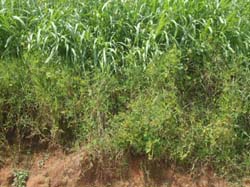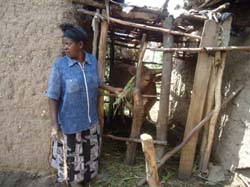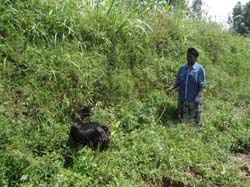Livestock keeping is a traditional practice of Banya-Rwanda (the people of Rwanda) as it provides families with income especially from sale of milk, meat and offspring. It also provides for manure, which is utilised as a cost-effective fertiliser to revitalise soil quality. Undeniably on the "eyes" of many Banya-Rwandas, having livestock is also a sign of wealth. Following civil strife in 1994, many farmers lost their animals and the livestock population in Rwanda decreased considerable. Under ‘One Cow Per Poor Family’ program the poor and vulnerable families, including genocide survivors, widows, orphans, people with disabilities and people living with HIV/AIDS, are acquiring productive assets in the form of a dairy cow or dairy goat. These groups are also provided with an integrated package of assistance, starting with participatory training that strengthens the social structures and gender equity. At the same time the groups are given in-depth training in sustainable organic agriculture, concentrating on vegetables, maize and beans for human consumption; using home-made compost for fertiliser, and welfare friendly livestock husbandry and housing that allows for good livestock management and manure and urine collection for soil fertility.
 |
 |
 |
|
Desmodium intortum established along with Pennisetum spp. in eroding contour Helen’s farm |
Helen feeding her one cow
|
Helen feeds her goat on established Desmodium
|
Although widely supported by Government One Cow per Poor Family" program is facing many challenges among, which is shortage of animal feeds as a result of insufficient land since food and cash crops are granted first priority to the available land. In March, 2012 N2Africa started testing tree fodder legume (Leucaena pallida and Leucaena diversifolia) and herbaceous fodder legumes (Medicago sativa, Desmodium intortum, Stylosanthes guianensis, Stylosanthes scabra, Clitoria ternatea, Desmanthus virgatus and Macroptilium atropurpureum) for adaptation, productivity, N2fixation and other environmental services such as soil erosion control. We are currently working with 40 households in Gakenke and Kamonyi districts. Our target niches in the farm are farm boundaries and contours bands. Madame Helen Kalekezi, one of participating farmer in Kamonyi has one cow and two goats. With good establishment of test legumes in her farm and their palatability to her animals she is becoming convinced that the our work will help to fill the feed gap while improving crop production from the same piece of land as well as improving performance of her animals.
Freddy Baijukya, Speciose Kantengwa and Innocent Nyamwasa

